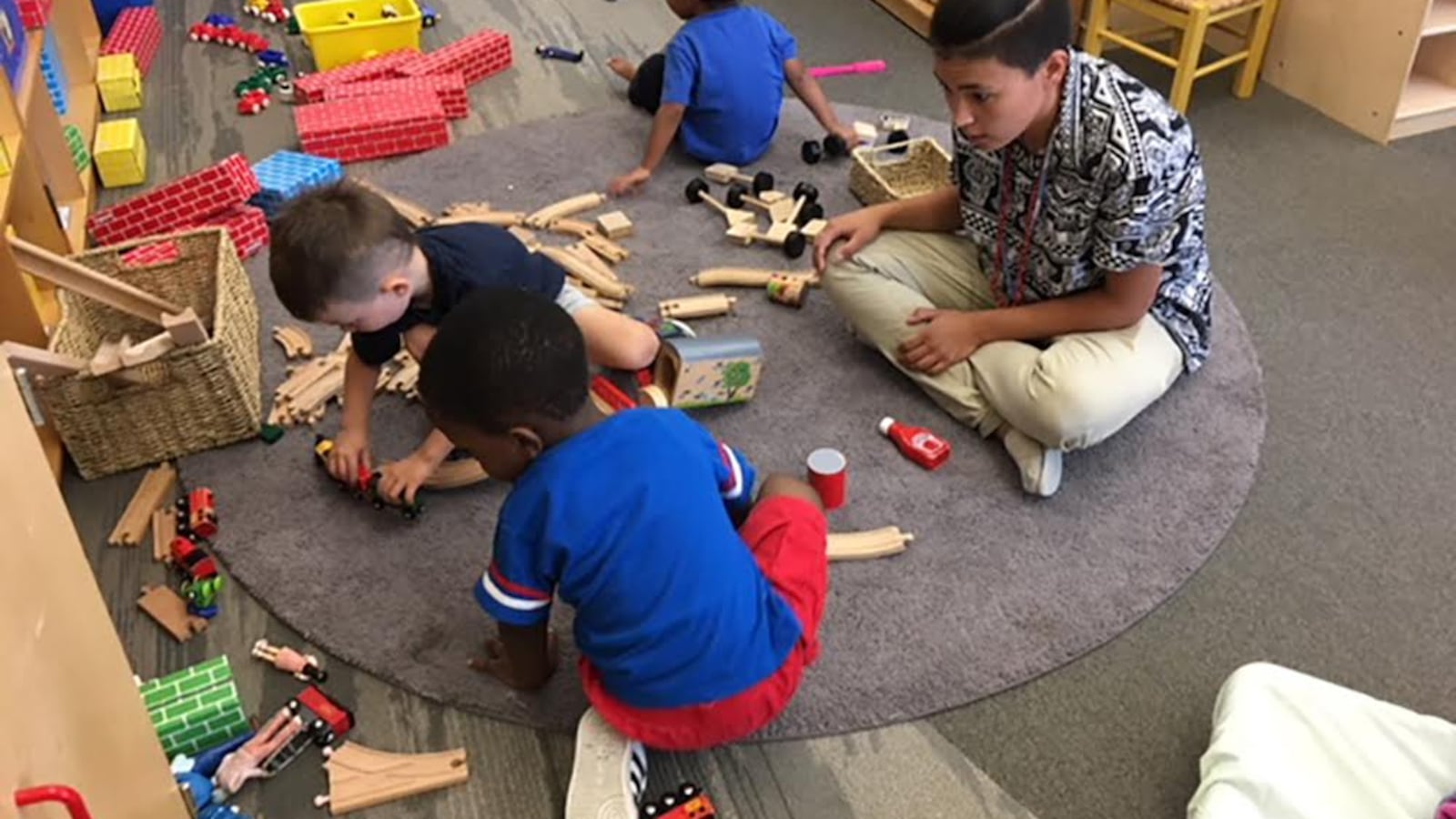Hiawatha Davis III, a 21-year-old Seattle native who majored in Africana studies in college, someday hopes to practice civil rights law. Ariel McPherson, 22, who grew up in a low-income family in Colorado Springs, sees education as a way to break down systems that oppress people. LeAnn Walker, 22, who comes from a tiny Missouri town, eventually wants to have a hand in education policy-making, but for now is happiest working with children.
All three are newly minted Denver preschool teachers, part of Teach For America’s inaugural foray into Colorado’s early childhood sector. After a six-week summer training course in Tulsa, Oklahoma, and another six days of training in Denver earlier this month, they and five other corps members have begun teaching 3- and 4-year-olds around the city.
Teach For America’s expansion into preschool here has prompted both enthusiasm and trepidation. Some advocates say the move will help bulk up the state’s spindly pipeline of early childhood teachers — a longstanding problem in Colorado, driven by the field’s low pay and the common misconception that early childhood workers are low-skill babysitters.
But Teach For America’s preschool initiative also raises familiar critiques about the 27-year-old nonprofit, which generally has supplied beginning teachers to low-income K-12 schools. Does the summer training regimen adequately prepare teachers for demanding posts teaching the youngest students? Is the two-year commitment too short in a field already plagued by high turnover?
Kathy Schultz, dean of the school of education at the University of Colorado Boulder, voiced concern on both counts.
“Teach For America has a lot of political power and access to fundraising, and I would prefer them to use that for long-term changes rather than short-term stopgap solutions,” she said. “If they really want to make a difference, it’s not just slotting teachers in for two years.”
Schultz, who once served as faculty director of Teach For America at the University of Pennsylvania, believes the organization should be pushing for bigger systemic fixes — things like higher teacher salaries or universal full-day kindergarten.
Officials at Denver’s Teach For America office agreed that such work is important and said they recently hired a full-time staff member to work on systems-level early childhood issues, possibly including preschool quality and teacher pay.
They also noted that local early childhood leaders encouraged them to expand their scope to preschool.
“We didn’t push into the (early childhood education) market. We were sort of pulled into it,” said Damion LeeNatali, executive director of the Colorado region of Teach for America.
He said the Denver-based Gary Community Investments, which gives grants and makes for-profit investments to help low-income children and families, funded a feasibility study to determine whether Teach for America should try early childhood placements. (Gary Community Investments, through the Piton Foundation, is a Chalkbeat funder.)
The study delivered a favorable conclusion and Gary subsequently awarded Teach for America a grant of nearly $800,000 to launch a two-year pilot program.
“Getting the stamp of approval … opened a lot of doors that wouldn’t have necessarily been open to us otherwise,” LeeNatali said.
Testing the waters
About a half-dozen of Teach For America’s 51 regions, including New York, Chicago and Indianapolis, already place teachers in preschools, but it’s a relatively new and narrow slice of the organization’s work.
In Colorado, there are eight early childhood corps members this year in contrast to 132 who are either in their first or second year teaching in K-12 classrooms. The format of the new early childhood track is similar to the K-12 track in that corps members receive about a month and a half of summer training and are considered lead teachers on Day One in the classroom. Next summer, five more early childhood corps members will join the first eight.
While the new early childhood corps members generally have bachelor’s degrees in subjects not directly related to early childhood education, the training they receive through Teach For America makes them eligible to teach preschool in Colorado. It’s one of several routes to becoming a qualified preschool teacher and fits with the state’s 2017 early childhood workforce plan, which prioritizes alternative pathways into the profession. There are other pathways that do not require a bachelor’s degree or an associate’s degree.
This year’s eight early childhood corps members will work at five preschools across the city — three operated by Mile High Early Learning and two operated by Sewall Child Development Center, which serves students with disabilities and typically developing children together.
The six corps members at Mile High locations will earn $18.50 an hour and the two at Sewall sites will earn around $17 an hour — in both cases less than corps members working in Denver’s K-12 schools.
Leaders at Mile High and Sewall say they’re optimistic about the partnership with Teach For America.
Pamela Harris, president and CEO of Mile High Early Learning, said, “I like that it’s people interested in education and interested in social justice … We feel like we offer a great opportunity for (them) to work in a quality setting with our most vulnerable children.”
Harris, who routinely loses about 30 percent of her staff annually, also said the two-year commitment required of corps members is “a bit of a relief.”
Heidi Heissenbuttel, Sewall’s president and CEO, said the program’s biggest benefit is the promise of qualified staff amid the state’s shortage of early childhood workers.
“It’s incredibly difficult to hire right now with the 2 percent unemployment rate in Colorado in general,” she said.
A 2017 survey of Colorado child care providers found that half of directors said they often had to fill positions with unqualified teachers.
While Heissenbuttel acknowledged concerns that Teach For America’s training program is abbreviated, she said, “It’s a start. It’s more than other people (have) coming in with the way the hiring goes.”
Schultz agreed that it may be better than what some preschool teachers get, but said “it doesn’t mean that’s where we have to settle.”
Both Heissenbuttel and Harris said corps members will get significant on-the-job training and coaching from their organizations during the Teach For America term.
Teach For America’s pilot program will launch a second early childhood pathway in 2019-20 with a fellowship program consisting of 20 corps members — all either Colorado natives or current residents. These “Launch Fellows” will spend a year in preschool classrooms working under master teachers while also receiving outside-the-classroom training on early childhood policy issues.
The idea behind the fellowship track, which LeeNatali describes as a “longer on-ramp” to early childhood work, is both to cultivate homegrown talent and groom future early childhood leaders.
It’s especially important now as many child care center directors near retirement, he said.
Diving in

On a recent summer morning, in a seventh-floor conference room at Teach For America’s Denver office, a trainer led Davis, McPherson, Walker and their five classmates through a discussion about how to include students with disabilities in early childhood classrooms.
L.J. Werner, a trainer and coach, asked the students how they might benefit from working with special needs children.
Davis, sitting at a table sprinkled with laptops, water bottles and thick handouts, said, “You’re going to grow because it’s going to push you out of your comfort zone.”
Werner agreed, recounting her anxiety the first time she worked with a young student who used a wheelchair and had a feeding tube.
“You have to lean into your fear,” she said.
Both McPherson and Walker are now working at Sewall preschools, one in the North Park Hill neighborhood and one in Green Valley Ranch.
McPherson, who majored in psychology and women’s and ethnic studies at the University of Colorado Colorado Springs, said she learned about Teach For America at a job fair last year.
During a lunch break at the recent training, she said she was “super-excited” to start.
“The little ones, I just think they’re absolutely brilliant,” she said.
McPherson, who envisions herself someday as a school psychologist or counselor, got her first taste of teaching preschoolers during the six-week summer training in Tulsa.
Davis, who’s working at a Mile High Early Learning preschool, also got some firsthand experience in Tulsa, though there were only three children in the class.
“I don’t think it prepared me in the way I would have liked to be prepared,” he said.
Davis learned about Teach For America from his older sister, formerly a corps member in Chicago, and said he was drawn to early childhood because it’s the critical first stage in life.
At the same time, he wants to help shake up the status quo, particularly when it comes to the diversity of the teaching force and curriculum.
“I haven’t found myself represented in my education, whether that’s in what I’m learning or the people who are teaching me these things,” he said.
Davis said he had only one teacher during his entire educational career who was black and male like him.
“Especially for students of color or students who find themselves isolated in certain instances,” he said, “I … want to make them feel more included and try to push the education system to help include them.”
Clarification: This story has been updated to reflect that Teach For America Colorado is working on statewide early childhood policy issues and is not only providing teachers for preschool classrooms.


